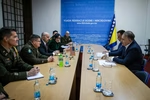
Bosnia and Herzegovina must improve its understanding of terrorist financing risks, particularly concerning nonprofit organizations and digital assets, enhance the efficiency of the Financial Intelligence Unit, prioritize money laundering investigations, and improve institutional coordination, according to new recommendations from MONEYVAL.
The Committee of Experts on the Evaluation of Anti-Money Laundering Measures and the Financing of Terrorism (MONEYVAL) has released a report assessing the effectiveness of Bosnia and Herzegovina’s AML/CFT system.
The report, based on an evaluation conducted between February 12 and 28, 2024, analyzes the country’s compliance with the Financial Action Task Force (FATF) 's 40 recommendations and provides suggestions for improving its framework.
Key areas for improvement
Beyond the primary recommendations, experts emphasize the need to strengthen asset seizure mechanisms and close legal loopholes in implementing targeted financial sanctions. While some steps have been taken, the report warns that Bosnia and Herzegovina still lacks an effective system for managing seized assets at the national level.
The country must also enhance risk-based supervision of non-financial entities and foster greater international cooperation in financial crime investigations.
The report states that while authorities in Bosnia and Herzegovina generally understand the risks of money laundering, their comprehension of terrorist financing risks remains limited. Although national AML/CFT strategies exist, it is unclear whether they adequately address all critical risks, and that coordination at the state level is insufficient. However, at the operational level, there are instances of good inter-agency cooperation.
Weaknesses in Financial Intelligence Unit and investigative processes
One major concern highlighted by MONEYVAL is the efficiency of the Financial Intelligence Unit (FIU), which primarily relies on financial intelligence gathered from reports on suspicious and cash transactions. Experts suggest that the FIU should expand its sources of information. Furthermore, most suspicious transaction reports are linked to tax offences, while those related to terrorist financing are rare and do not reflect the country’s risk profile.
Money laundering investigations are being conducted, but the most common form remains self-laundering. Investigations and prosecutions only partially align with the country’s risk profile, with fraud being the most frequent predicate offence associated with money laundering.
However, MONEYVAL warns of serious systemic deficiencies, including the absence of a mechanism for prioritizing money laundering cases, unjustified delays in judicial proceedings, and inconsistencies in how prosecutors and investigative bodies interpret these crimes.
Concerns over terrorist financing investigations
The report highlights that the number of investigations and convictions for terrorist financing in Bosnia and Herzegovina is, allegedly, alarmingly low. “The results achieved (one conviction and one trial ending in acquittal) do not correspond with the country’s risk profile,” the report states.
Additionally, the report claims that judges, prosecutors, and investigators have a limited understanding of terrorist financing offences. There are no reliable statistics on the total number of identified and investigated cases. While authorities have presented three ongoing cases related to the financing of foreign terrorist fighters, the outcomes of financial investigations remain unclear.
Penalties for undeclared money are minimal, disproportionate, and fail to act as a deterrent. Asset confiscations are only partially aligned with the country’s risk profile.
Lack of effective sanctions and supervision of nonprofit organizations
MONEYVAL emphasizes that for much of the evaluation period, there was no coherent framework for targeted financial sanctions (TFS). While an identification process for TFS subjects exists, its effectiveness is undermined by significant delays.
Furthermore, Bosnia and Herzegovina has not implemented asset freezes related to terrorist financing, and nonprofit organizations are not adequately monitored for potential abuse. There are no significant initiatives aimed at preventing terrorist financing within the nonprofit sector, and risk-based supervision is yet to be established.
Urgent need for reforms
The MONEYVAL report serves as a serious warning to authorities in BiH, highlighting the urgent need to take measures to ensure that the country’s anti-money laundering and counter-terrorism financing system becomes more effective and aligned with international standards.
Kakvo je tvoje mišljenje o ovome?
Učestvuj u diskusiji ili pročitaj komentare





 Srbija
Srbija
 Hrvatska
Hrvatska
 Slovenija
Slovenija



























































